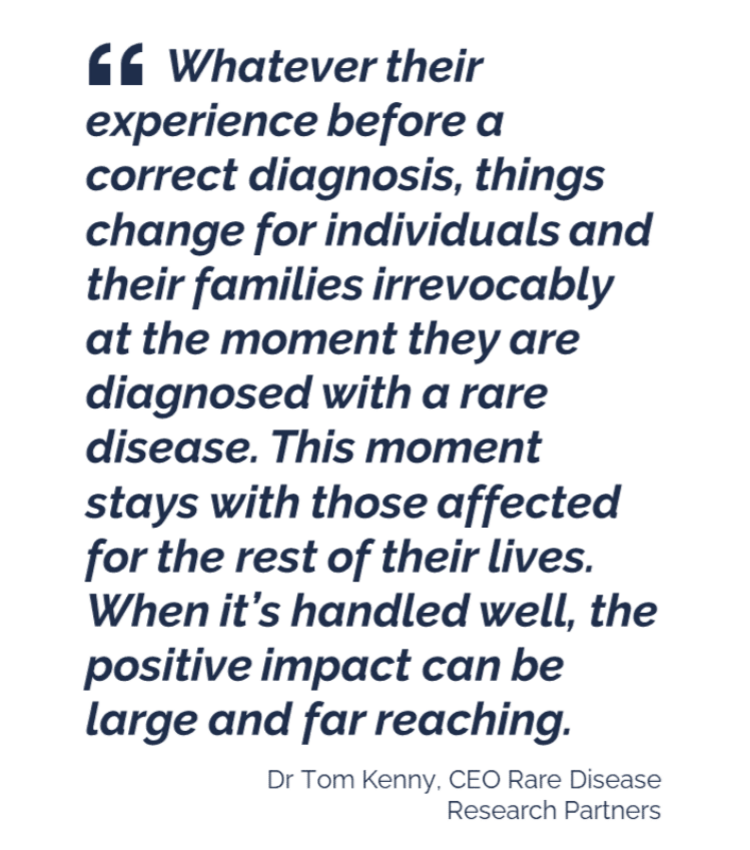
Project Background
The phrase ‘diagnostic odyssey’ is well known among those in the rare disease community, with a long and convoluted path to a definitive diagnosis being all too common. Sadly, the moment that a diagnosis is made does not automatically alleviate the emotional burden on patients and their families. It is psychologically complex and can pose an equivalent emotional odyssey’ all of its own.
While this impact is recognized, there was no one place where all the current evidence and good practice was drawn together.
During 2021, RBW Consulting partnered with Rare Disease Research Partners, an organization focused specifically on supporting research and access to treatment for people living with rare conditions, and worked with a wide range of experts within the field, to try and change that.

Contributors
We are grateful to the following individuals and organizations who have contributed to the project with their opinion, experience, peer review and support:
Jo Balfour | Cambridge Rare Disease Network |
Kathleen Bogart | School of Psychological Science, Oregon State University |
Dr Ronny Cheung | Consultant & Head of Service for General Paediatrics at Evelina London Children's Hospital |
Albert Freedman | Freedman Counselling Associates |
Claire Garthwaite | With Mindfulness |
Susie Henley | Neurofibromatosis Centre, Guy’s and St Thomas’ NHS Foundation Trust |
Stacy Hurt | Independent Consultant |
Lucy McKay | Medics4RareDiseases |
Shehla Mohammed | Clinical Genetics, Guy’s Hospital |
Jill Walton | Rare Dementia Support, National Brain Appeal |
Kym Winter | RaremindsCIC |
Deborah Woodman | Department of Psychology, Evelina London |

What the project involved & the future ambition
The scope of the project primarily focused on diagnoses of rare diseases made in infancy and early childhood, although the findings and their implications are likely to be more widely applicable.
The project comprised two key stages:-
A systematic literature review - relevant articles sourced using the electronic database PubMed, and reference listing
Development of a Statement of Good Practice - raising awareness and providing guidance for healthcare and other supporting professionals and organizations
Throughout the process, contributions were sought from a wide range of relevant perspectives, including families living with a rare disease and healthcare professionals with expertise spanning clinical psychology, paediatrics, genetics and mental health support.
These resources are now being actively disseminated within the rare disease community, through multiple channels including peer review publication. They are freely available to anyone with an interest in supporting patients and their families at this key point in their rare disease journey, and our hope is that they will be used to support the future development of services, initiatives, and programmes delivered by the wide range of organizations involved - providing both a strong evidence base and practical advice too.

(please note, a simple registration will be required)

What do you think?
We hope that this project and its materials equips those working in rare diseases with new information, a robust collection of the evidence and also some inspiration on ways to ensure that every moment of a rare disease diagnosis is handled well.
Here’s some thoughts from supporters so far, but we’d love to hear your thoughts too!
Please get in touch with the project team here if you would like to discuss the findings further, or simply to provide any feedback.
“Alone we can do so little; together we can do so much”- Helen Keller
